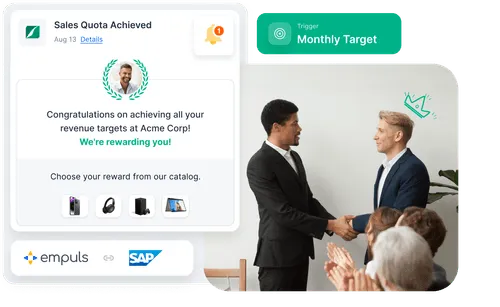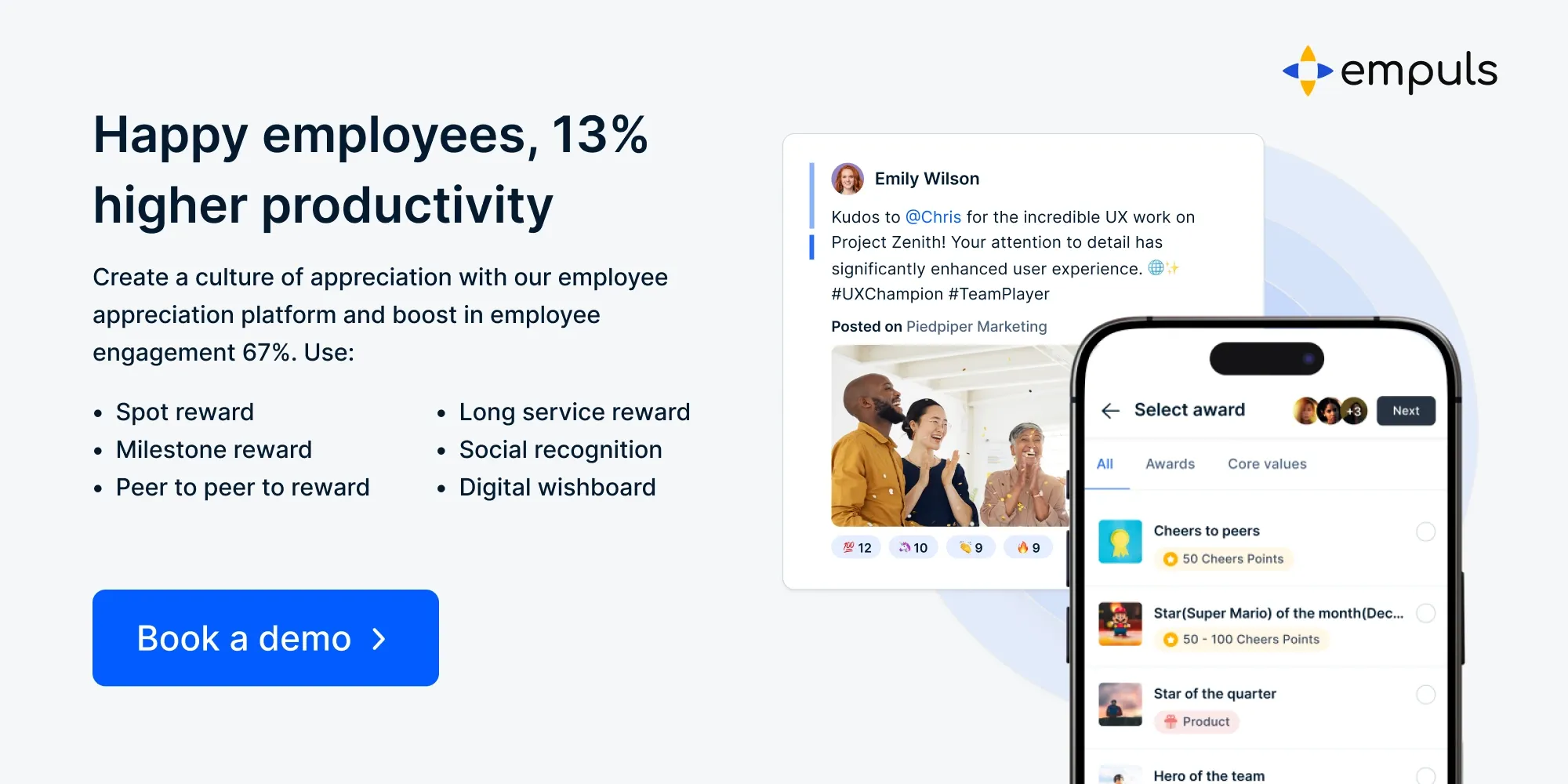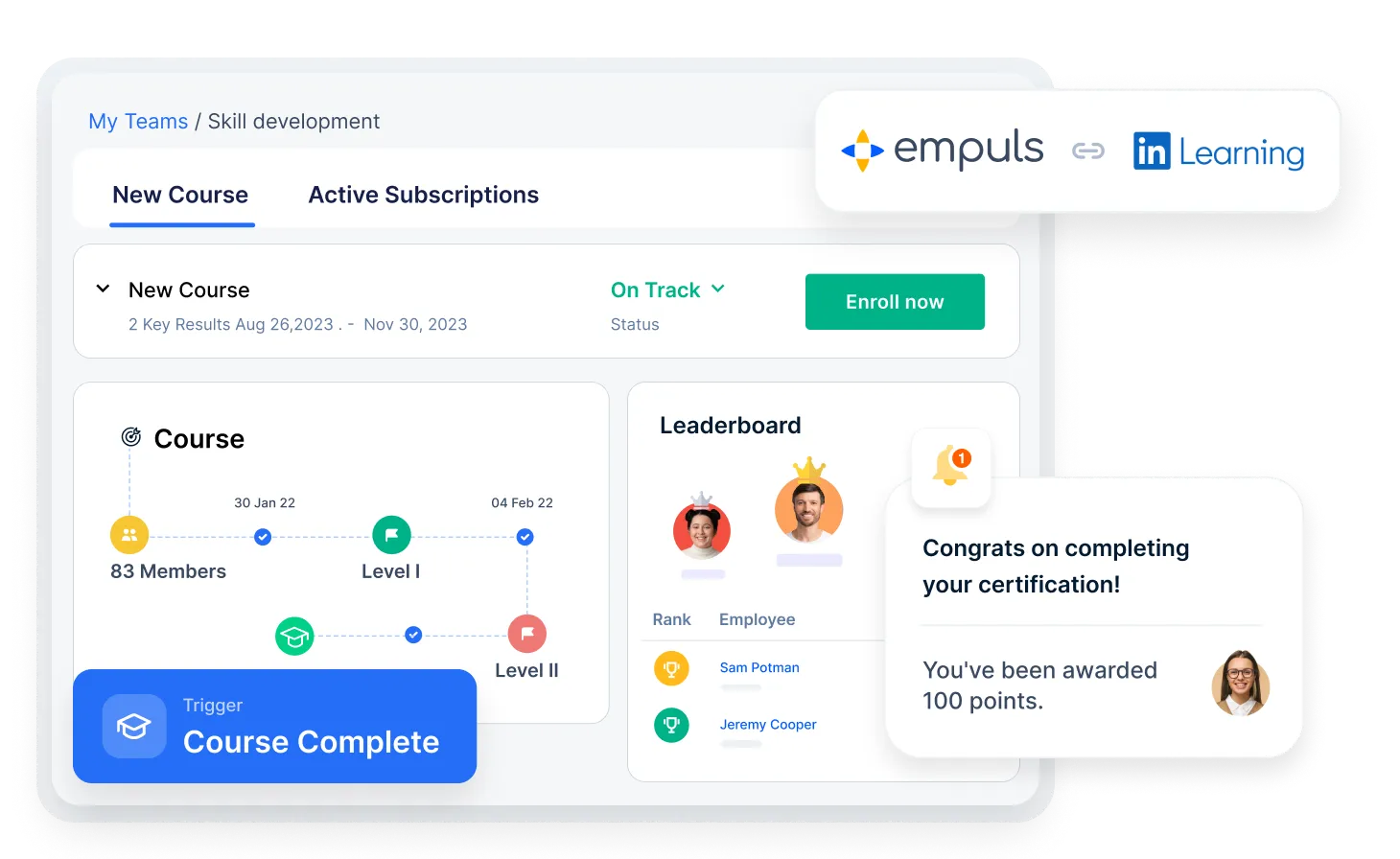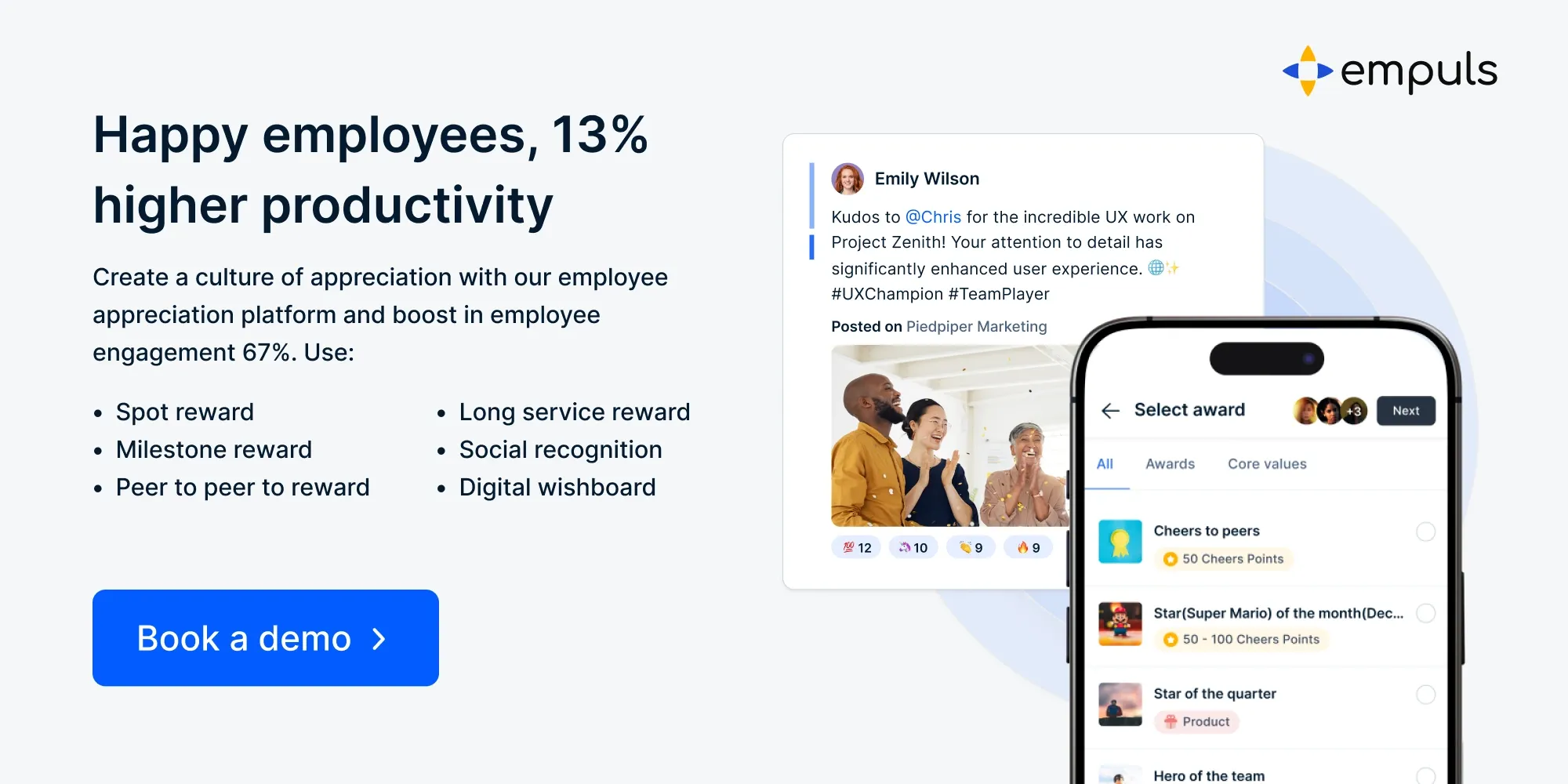30 برنامج تحفيز للموظفين يجب التفكير في تشغيلها في عام 2025 من أجل مشاركة أفضل
اكتشف 30 برنامجاً فعالاً لتحفيز الموظفين لتعزيز المشاركة والأداء. اكتشف استراتيجيات لفرق العمل عن بُعد وقياس نجاح برنامجك.
في هذه الصفحة
يعد عدم الارتباط بين الموظفين مشكلة ملحة تؤدي إلى ارتفاع معدلات دوران الموظفين وانخفاض الإنتاجية وخسائر مالية كبيرة. في الواقع، يكلف الموظفون غير الراضين الاقتصاد الأمريكي مبلغاً مذهلاً قدره $1.9 مليار دولار سنويًا. وهذا يسلط الضوء على الحاجة الماسة إلى برامج فعالة لمكافآت الموظفين.
برامج حوافز الموظفين هي أدوات قوية لإعادة إشعال المشاركة والحماس في مكان العمل. يمكن لبرنامج تقدير مصمم جيدًا أن يزيد الإنتاجية بنسبة تصل إلى 44%.
ومع ذلك، قد يكون اختيار برنامج الحوافز المناسب للموظفين أمراً صعباً في ظل وجود العديد من الخيارات المتاحة. في هذا الدليل، سوف نستكشف 30 مثالاً على برامج الحوافز الفعالة للموظفين ونشارك نصائح عملية لضمان نجاحها.
ما هو برنامج حوافز الموظفين؟
برنامج حوافز الموظفين هو نظام مكافآت مصمم لتحفيز الموظفين وتعزيز أدائهم. تشمل بعض برامج حوافز الموظفين الأكثر شيوعًا التدريب والتطوير القيادي,المكافآت النقدية، والمكافآت غير النقدية، وأنشطة بناء الفريق، وحقائب الهدايا التذكارية في المكتب/مكان العمل، والمكافآت الإضافية، والجوائز التقديرية، وبرامج الامتيازات والخصومات، وما إلى ذلك.
تهدف برامج حوافز الموظفين الفعالة إلى تقدير الموظفين ومكافأتهم على إنجازاتهم، وتعزيز بيئة العمل الإيجابية بيئة عمل إيجابية. إذا تم تنفيذ برنامج حوافز للموظفين، فقد تلاحظ المؤسسة:
- زيادة في مشاركة الموظفين والروح المعنوية.
- من خلال تقديم مكافآت مالية، مثل الحوافز النقدية أو خطط ملكية الأسهم، يمكن للشركات تحفيز الموظفين على التفوق في أدوارهم.
- تشجع هذه البرامج أعضاء الفريق على المشاركة بفاعلية في تحقيق أهداف الشركة، مما يؤدي إلى تحسين الرضا الوظيفي وارتفاع معدلات الاحتفاظ بالعملاء.
عندما يشعر الموظفون بالتقدير من خلال برامج التقدير والحوافز المالية، فإن ذلك يعزز تجربتهم بشكل عام ويعزز ثقافة الولاء، مما يعود بالنفع على نجاح المؤسسة في نهاية المطاف. دعنا نلقي نظرة على ما تظهره الإحصائيات:
أظهر بحث أجرته مؤسسة غالوب أن 74% من الموظفين الذين يحصلون على حوافز يوافقون بشدة على أن عملهم يشعرهم بالقيمة والجدوى.
-> دراسة IRF كشفت أن 84% من الشركات الأمريكية تستثمر في نقاط المكافآت وبطاقات الهدايا والرحلات والبضائع والمكافآت التجريبية، وتنفق مجتمعةً 176 مليار دولار سنويًا لمكافأة موظفي المبيعات والموظفين.
-> أشارت الدراسة نفسها إلى أنه في أمريكا الشمالية، هناك زيادة صافية بنسبة 37% في ميزانيات البضائع وبطاقات الهدايا وإهداء الفعاليات. من المتوقع حدوث نمو حتى عام 2025 لكل من عدد المشاركين في الرحلات التحفيزية والإنفاق لكل شخص.
-> دراسةدراسة HBRأن وجود فريق مبيعات أكثر سعادة مع الحوافز يمكن أن يعزز المبيعات بنسبة تصل إلى 37%.
-> Aدراسة أجرتها SHRMتشير إلى أن الشركات التي لديها برنامج حوافز تحقق إنتاجية أعلى للموظفين بنسبة 52%.
-> من المثير للصدمة أن 33% فقط من الموظفين يشعرون بالتفاعل والتقدير في مكان عملهم، ويرتبط ذلك مباشرةً بالحوافز، وفقًا لدراسة أجرتها مؤسسة جالوب.
تؤكد هذه الرؤى على الدور الحاسم لـ تقدير الموظفين والحوافز في مشهد الأعمال اليوم، مع التأكيد على قيمتها في تحفيز الموظفين والاحتفاظ بهم.
حوافز الموظفين مقابل مكافآت الموظفين
حوافز الموظفين هي برامج محددة مصممة لتحفيز الموظفين على تحقيق أهداف معينة، وغالباً ما تكون مرتبطة بمقاييس الأداء. ومن الأمثلة على ذلك المكافآت النقدية ومشاركة الأرباح وسداد الرسوم الدراسية.
من ناحية أخرى مكافآت الموظفين هي مكافآت تقديرية أو المزايا التي تُمنح للإنجازات، مثل المكافآت النقدية أو التأمين الصحي أو برامج العافية، والتي تهدف إلى تقدير مساهمات الموظفين.
كيف تؤثر برامج الحوافز على أداء الموظفين ومشاركتهم؟
تلعب الحوافز دورًا حاسمًا في تعزيز أداء الموظفين ومشاركتهم. فهي بمثابة محفزات خارجية تشجع على سلوكيات محددة تتماشى مع الأهداف التنظيمية.
- برامج الحوافز تعزز الأداء: يمكن لبرامج الحوافز جيدة التنظيم أن تعزز أداء الموظفين بنسبة 22% في المتوسط، مع احتمال أن تؤدي الحوافز الجماعية إلى زيادة الأداء بنسبة تصل إلى 44%.
- التأثير على المشاركة والرضا: من المرجح أن يكون الموظفون الذين يشعرون بالتقدير والتقدير أكثر انخراطاً في العمل. أشارت دراسة استقصائية إلى أن 79% من الموظفين سيعملون بجدية أكبر إذا تم الاعتراف بجهودهم وتحفيزهم بشكل أفضل.
- الحوافز المالية تزيد من التحفيز: تعمل المكافآت المالية، مثل المكافآت والأجور القائمة على الأداء، على تعزيز الرضا الوظيفي والتحفيز بشكل كبير. حيث تعمل هذه الحوافز على مواءمة الأهداف الشخصية مع الأهداف التنظيمية، مما يشجع الموظفين على السعي لتحقيق أداء وظيفي أعلى.
- تتطلب المشاركة طويلة الأجل نهجاً شاملاً: وعلى الرغم من أهمية الحوافز، إلا أنها يجب أن تكون جزءاً من استراتيجية أوسع نطاقاً تتضمن ثقافة عمل إيجابية وفرصاً للنمو. تشهد الشركات المنخرطة 22% من ولاء العملاء بنسبة 22% وانخفاض معدل دوران الموظفين بنسبة 65%.
- تخصيص الحوافز لتحقيق الفعالية: يعتمد نجاح برامج الحوافز على تصميمها وتنفيذها. فتخصيص الحوافز لتناسب احتياجات الموظفين ودوافعهم يمكن أن يؤدي إلى نتائج أفضل.
- عواقب ضعف هياكل الحوافز: يمكن أن تؤدي برامج الحوافز غير الفعالة إلى فك الارتباط والإرهاق و"الاستقالة الهادئة"، مما يسلط الضوء على الحاجة إلى تطوير برنامج مدروس.
تؤكد هذه الرؤى على الدور الهام الذي تلعبه برامج تحفيز الموظفين المصممة بشكل جيد في تعزيز أداء الموظفين ومشاركتهم.
باستخدام Empuls قامت شركة SPI Cinemas برقمنة برنامج المشاركة الخاص بها. وقد أتاح ذلك لموظفيها الوصول الفوري إلى المعالم التي يحتاجون إلى تحقيقها، وبعد ذلك يمنحهم النظام تلقائياً نقاطاً قابلة للاسترداد في بوابة متاجر Xoxoday(كتالوج).
وانخفضت نسبة الاستنزاف من 8% إلى 4.5% بعد تطبيق برنامج Empuls منصة مشاركة الموظفين,غرس ثقافة التقديروالتدفق الحر للمعلومات ونظام المكافآت الشفاف.
20 فكرة لبرامج تحفيز الموظفين لتحفيز القوى العاملة المتحمسة
تساعد برامج حوافز الموظفين العشرين هذه على تعزيز التحفيز وتحسين الاحتفاظ بالموظفين وخلق مكان عمل يشعر فيه الموظفون بالتقدير. يضمن اختيار المزيج الصحيح من المكافآت المشاركة والإنتاجية على المدى الطويل.
1. برنامج تقدير الإنجاز
يركز هذا البرنامج على تقدير الموظفين الذين يحققون أهداف أدائهم أو يتجاوزونها. ويشمل جوائز شهرية، مثل اللوحات أو الشهادات، إلى جانب التقدير العلني خلال اجتماعات الفريق. ومن خلال الاحتفال بالإنجازات، فإن هذا البرنامج يرفع معنويات الموظفين ويشجع ثقافة التميز.
2. برنامج المكافآت الصحية
يهدف هذا البرنامج إلى تعزيز أنماط الحياة الصحية، حيث يقدم حوافز للمشاركة في الأنشطة الصحية، مثل عضوية الصالة الرياضية أو تحديات اللياقة البدنية. يمكن للموظفين الحصول على نقاط مقابل إكمال المهام المتعلقة بالصحة، والتي يمكن استبدالها بمكافآت مثل بطاقات الهدايا أو الإجازات الإضافية. وهذا لا يحسن صحة الموظفين فحسب، بل يعزز أيضاً الرضا الوظيفي العام.
شجع قوة عاملة أكثر صحة وتفاعلاً مع Empuls. كافئ الموظفين على الأنشطة الصحية من خلال نقاط قابلة للاسترداد وبطاقات هدايا وإجازات إضافية - كل ذلك في منصة واحدة سلسة.
3. برنامج التطوير المهني
تدعم هذه المبادرة الموظفين في مواصلة التعليم وتطوير المهارات من خلال سداد الرسوم الدراسية والوصول إلى الدورات التدريبية عبر الإنترنت. يتم تشجيع الموظفين على وضع أهداف مهنية، وتوفر الشركة المساعدة المالية لبرامج التدريب ذات الصلة. يعزز هذا الاستثمار في نمو الموظفين الولاء والمشاركة.
4. خطة تقاسم الأرباح
في هذا البرنامج، يحصل الموظفون على حصة من أرباح الشركة بناءً على أدائها المالي. يعمل هذا الحافز المالي للموظفين على مواءمة مصالح الموظفين مع نجاح الشركة، مما يحفزهم على المساهمة في تحقيق أهداف الشركة. كما أنه يعزز من الاحتفاظ بالموظفين من خلال جعلهم يشعرون بأنهم جزء لا يتجزأ من الشركة.
5. خطة ملكية الأسهم للموظفين (ESOP)
يتيح برنامج ESOP للموظفين الحصول على أسهم في الشركة، مما يعزز الشعور بالملكية والالتزام. عندما يرى الموظفون التأثير المباشر لعملهم على أداء الشركة، يتم تحفيزهم على تعزيز الإنتاجية والتعاون. يمكن لهذا البرنامج أن تعزيز ولاء الموظفين ورضاهم.
6. برنامج مكافأة الإحالة
يحفز هذا البرنامج الموظفين الحاليين على إحالة المرشحين المؤهلين لشغل الوظائف الشاغرة في الشركة. ويحصل الموظفون على مكافأة مالية إذا تم توظيف من أحالوه وبقي في الشركة لفترة محددة. وهذا لا يساعد فقط على جذب أفضل المواهب بل يعزز أيضاً الشعور بالانتماء للمجتمع بين أعضاء الفريق.
7. حوافز أداء الفريق
في إطار هذا البرنامج، يتم مكافأة الفرق التي تحقق أهدافاً محددة أو تتجاوز الأهداف بشكل جماعي بمكافآت أو نزهات جماعية. وهذا يشجع على التعاون والعمل الجماعي مع تعزيز روح الزمالة بين أعضاء الفريق. مثل هذه الحوافز للموظفين في برنامج الحوافز تعزز المشاركة العامة وتحفيز الموظفين.
8. برنامج ترتيبات العمل المرنة
تسمح هذه المبادرة للموظفين باختيار ساعات عملهم أو خيارات العمل عن بُعد بناءً على احتياجاتهم الشخصية. من خلال توفير المرونة، يمكن للشركات تعزيز التوازن بين العمل والحياة الشخصية والرضا الوظيفي بين الموظفين. يدرك هذا البرنامج أن احتياجات الموظفين المتنوعة تساهم في زيادة إنتاجية القوى العاملة.
9. برنامج المكافآت الفورية
يوفر برنامج المكافآت الفورية تقديراً ومكافآت فورية للأداء الاستثنائي أو المساهمات التي تتجاوز التوقعات. يمكن للمدراء إصدار هذه المكافآت في أي وقت، مما يجعلها مناسبة وفي الوقت المناسب. يشجع هذا النهج الأداء العالي المستمر ويعزز السلوكيات الإيجابية في الوقت الفعلي.
10. برنامج التقدير العام
يركز هذا البرنامج على الاعتراف بإنجازات الموظفين علنًا من خلال النشرات الإخبارية أو وسائل التواصل الاجتماعي أو لوحات التقدير في مكان العمل. ولا يؤدي هذا الظهور العلني إلى رفع الروح المعنوية فحسب، بل يشجع الآخرين على السعي للحصول على تقدير مماثل، مما يخلق ثقافة التقدير داخل المؤسسة.
11. المكافآت النقدية لأهداف المبيعات
في برنامج الحوافز هذا، يحصل الموظفون الذين يحققون أهداف المبيعات أو يتجاوزونها على مكافآت نقدية تقديراً لجهودهم. يحفز هذا الحافز المالي المباشر فرق المبيعات على بذل أقصى ما في وسعهم مع مواءمة جهودهم مع أهداف الشركة، مما يؤدي في النهاية إلى نجاح الأعمال.
مع المكافآت والحوافز المغرية عبر Empuls، يمكن للمؤسسات تحفيز محترفي المبيعات على التفوق، وتعزيز ثقافة الإنجاز وتحقيق النجاح المستدام للأعمال.

12. برنامج موظف الشهر
يؤدي تكريم "موظف الشهر" إلى تعزيز المنافسة الصحية بين أعضاء الفريق مع تسليط الضوء على المساهمات الفردية في نجاح المؤسسة. ويحصل الموظف الذي يتم اختياره على لوحة تذكارية أو مكان محجوز لوقوف السيارات أو غيرها من الامتيازات التي تعزز مكانته داخل الشركة.
13. برنامج الإجازة التطوعية (VTO)
يسمح هذا الحافز الفريد للموظفين بأخذ إجازة مدفوعة الأجر للتطوع في القضايا التي يهتمون بها. من خلال تشجيع المشاركة المجتمعية، لا تدعم الشركات المبادرات الخيرية فحسب، بل تعزز أيضاً رضا الموظفين ومشاركتهم من خلال تجارب هادفة خارج العمل.
14. برنامج حوافز المزايا الصديقة للأسرة
يُظهر تقديم مزايا مثل الإجازة الوالدية أو المساعدة في رعاية الأطفال أو خيارات التأمين الصحي العائلي التزام المؤسسة بدعم الاحتياجات العائلية للموظفين. وتساعد هذه الحوافز على الاحتفاظ بالموظفين والمواهب من خلال خلق مكان عمل شامل يشعر فيه الموظفون بالتقدير على المستويين الشخصي والمهني.
15. المعتكف السنوي أو رعاية المؤتمرات
توفر رعاية حضور مؤتمرات الصناعة أو تنظيم خلوات سنوية فرصاً للتواصل والتعلم خارج بيئة المكتب. يقدّر الموظفون هذه التجارب لأنها تساهم في النمو المهني مع تعزيز الترابط بين أعضاء الفريق من خلال التجارب المشتركة.
16. برنامج الإرشاد الداخلي
الاقتران الموظفين ذوي الخبرة مع أعضاء الفريق الجدد يعزز تبادل المعرفة والتطوير المهني داخل المؤسسة. تعمل برامج الإرشاد على خلق بيئة داعمة يشعر فيها الموظفون بالتقدير والتشجيع على النمو في حياتهم المهنية مع تعزيز مشاركة الموظفين بشكل عام.
17. خصومات أقساط التأمين الصحي
إن تقديم خصومات على أقساط التأمين الصحي مقابل المشاركة في برامج العافية يحفز السلوك الصحي بين الموظفين مع تقليل التكاليف لكلا الطرفين المعنيين. تشجع مثل هذه الحوافز المالية في برنامج الحوافز الأفراد على إعطاء الأولوية لرفاهيتهم مع الشعور بالدعم من مبادرات صاحب العمل.
18. برنامج تمويل المشاريع الإبداعية
إن السماح للموظفين باقتراح مشاريع إبداعية تتعلق بأدوارهم - وتوفير التمويل لتلك المبادرات - يشجع على الابتكار في بيئة العمل. ويشعر الموظفون بالتمكين عندما تتاح لهم الفرص لمتابعة الأفكار التي تتماشى مع أهداف الشركة مع عرض مواهبهم.
19. ورش عمل تقاسم المهارات
إن تنظيم ورش عمل حيث يمكن للموظفين مشاركة مهاراتهم يعزز التعاون مع تعزيز التعلم المستمر داخل الفرق. تخلق هذه الجلسات جواً شاملاً حيث يكون لدى الجميع شيء قيّم يساهمون به، مما يعزز رضا الموظفين بشكل عام.
20. مبادرات التحسين القائمة على التغذية المرتدة
يتيح تنفيذ جلسات التغذية الراجعة المنتظمة سماع أصوات الموظفين فيما يتعلق بالتحسينات المحتملة في البرامج الحالية. ومن خلال جمع المدخلات من الموظفين بنشاط، تثبت المؤسسات أنها تقدر الآراء، مما يؤدي إلى زيادة الثقة والولاء والمشاركة بين أعضاء الفريق.

10 برامج تحفيز الموظفين عن بُعد
تساعد هذه البرامج العشرة لتحفيز الموظفين عن بُعد في الحفاظ على تحفيز فرق العمل وتواصلها وتفاعلها. إن تقديم المكافآت والتقدير الهادف يضمن الإنتاجية والرضا الوظيفي، بغض النظر عن مكان عمل الموظفين.
1. أيام تقدير العمل عن بُعد
يساعد تخصيص أيام محددة يتم فيها الاحتفال بالعاملين عن بُعد بفعاليات افتراضية أو هدايا خاصة على رفع الروح المعنوية بين العاملين من المنزل. تعزز أيام التقدير هذه الروابط بين فرق العمل عن بُعد مع إظهار الامتنان لمساهماتهم.
2. رواتب التعلم
يشجع توفير الرواتب المخصصة للدورات التدريبية عبر الإنترنت أو موارد التطوير المهني الموظفين عن بُعد على تعزيز مهاراتهم في المنزل. يعكس هذا الاستثمار التزام المؤسسة بالتعلم المستمر، مما يعزز الولاء بين أعضاء الفريق.
سواء أكان إكمال وحدة تدريبية، أو الحصول على شهادة جديدة، أو إتقان مهارة صعبة، قم بتحفيز وتحفيز موظفيك على الاستثمار في تطويرهم المهني والشخصي مع Empuls.

3. منح تعزيز المكتب المنزلي
يتيح تقديم المنح لتحسين إعدادات المكاتب المنزلية للعاملين عن بُعد إنشاء بيئات عمل مريحة مصممة خصيصاً لتلبية احتياجاتهم. يوضح هذا الدعم المالي أن أصحاب العمل يهتمون برفاهية الموظفين، مما يؤدي إلى زيادة مستويات الإنتاجية.
4. دردشات قهوة افتراضية شهرية مع القيادة
يؤدي تنظيم جلسات قهوة افتراضية غير رسمية بين فرق القيادة والموظفين عن بُعد إلى تعزيز قنوات التواصل المفتوحة. تتيح هذه الجلسات للموظفين مشاركة الأفكار مباشرةً مع صانعي القرار مع الشعور بالتقدير كجزء من ثقافة المؤسسة.
5. الاعتراف من خلال المنصات الرقمية
يؤدي استخدام المنصات الإلكترونية المخصصة فقط لتقدير الإنجازات إلى خلق بيئة شاملة يشعر فيها العاملون عن بُعد بالتقدير. يؤدي تسليط الضوء على الإنجازات بانتظام إلى تعزيز الروح المعنوية مع تشجيع الآخرين عبر الفرق المتفرقة.
اجعل كل موظف يشعر بالتقدير، بغض النظر عن مكان عمله. Empuls يساعدك على تعزيز ثقافة التقدير من خلال التقدير السلس والجذاب.
6. خيارات جدولة مرنة للأدوار عن بُعد
إن السماح بالمرونة في ساعات العمل يُمكِّن العاملين عن بُعد من خلال استيعاب الالتزامات الشخصية دون التضحية بالإنتاجية. تستفيد المؤسسات من زيادة مستويات الرضا الوظيفي الناتجة عن تعزيز فرص التوازن بين العمل والحياة الشخصية.
7. أنشطة بناء الفريق من خلال أدوات عقد المؤتمرات عبر الفيديو
تشجع جدولة أنشطة بناء الفريق الافتراضية المنتظمة على التعاون بين الزملاء عن بُعد الذين قد يشعرون بالعزلة. تعمل الألعاب أو التحديات الممتعة على تعزيز الصداقة الحميمة مع تقوية العلاقات بين الفرق المتباعدة جغرافياً.
8. تحديات الصحة والعافية المصممة خصيصاً للعاملين عن بُعد
إن تنفيذ تحديات صحية مصممة خصيصاً للعاملين عن بُعد يعزز العادات الصحية مع بناء صداقة حميمة بين المشاركين. يمكن منح حوافز مثل بطاقات الهدايا في برنامج الحوافز بناءً على مستويات المشاركة، مما يشجع على المشاركة الفعالة بين جميع الموظفين.
9. ملاحظات شكر شخصية من الإدارة
يؤدي إرسال رسائل شكر مكتوبة بخط اليد تعبر عن التقدير تجاه المساهمات الفردية إلى إنشاء روابط ذات مغزى حتى عند العمل عن بُعد. تعزز مثل هذه اللفتات الشعور بالقيمة داخل ثقافة المؤسسة، مما يعزز الرضا الوظيفي العام.
10. العلاقات التعاونية
إن إنشاء نظام اقتران إرشادي يربط بين الموجهين ذوي الخبرة والموظفين عن بُعد يعزز تبادل المعرفة مع توفير فرص التطوير المهني. وتدعم هذه المبادرة النمو الوظيفي مع بناء علاقات تعاونية قوية على الرغم من المسافات المادية.
كيف تبدأ برنامج حوافز الموظفين؟
إن برنامج حوافز الموظفين المنظم جيدًا لا يحفز الموظفين فحسب، بل يعزز أيضًا ثقافة مكان العمل، ويحسن الاحتفاظ بالموظفين، ويعزز الإنتاجية الإجمالية. ومع ذلك، فإن مجرد تقديم المكافآت ليس كافياً - يعتمد النجاح على التخطيط والتنفيذ الدقيق. إليك كيفية إنشاء برنامج يحقق تأثيرًا حقيقيًا.
1. حدد أهدافك ومقاييسك
قبل إطلاق برنامج الحوافز، حدد ما تريد تحقيقه. سواء كان ذلك تعزيز الإنتاجية، أو زيادة الاحتفاظ بالموظفين، أو تحسين مشاركة الموظفين، أو تعزيز العمل الجماعي، فإن وجود أهداف واضحة وقابلة للقياس يضمن توافق البرنامج مع أهداف العمل.
تساعد المقاييس مثل تحسينات الأداء ومعدلات المشاركة ودرجات رضا الموظفين على تتبع النجاح وإجراء التعديلات عند الحاجة.
2. اختر الحوافز التي تهمك
الحوافز المناسبة تُحدث فرقاً كبيراً. في حين أن المكافآت النقدية مثل المكافآت وزيادة الرواتب فعالة، إلا أن الموظفين يقدّرون أيضاً الحوافز غير النقدية مثل فرص النمو الوظيفي والمزايا الصحية والتقدير العام.
يعمل مزيج من المكافآت الشخصية والمرنة بشكل أفضل. تتيح منصات مثل Empuls للمكافآت والتقدير للشركات تقديم حوافز متنوعة، بما في ذلك بطاقات الهدايا والتجارب والامتيازات المصممة خصيصاً لتناسب تفضيلات الموظفين الفردية.
3. وضع معايير واضحة وعادلة
يحتاج الموظفون إلى فهم كيف يمكنهم كسب المكافآت ليظلوا متحمسين. يمكن أن يؤدي الغموض أو المحسوبية إلى تثبيط الموظفين بدلاً من إلهامهم. حدّد معايير موضوعية وشفافة وشاملة - سواء كانت قائمة على الأداء أو السلوك أو الابتكار أو العمل الجماعي.
إن ضمان التوازن بين المكافآت الفردية والجماعية يمنع المنافسة غير الصحية ويشجع على التعاون.
4. أتمتة وتبسيط توزيع الحوافز
إن إدارة الحوافز يدويًا تستغرق وقتًا طويلاً وعرضة للأخطاء. إن أتمتة العملية توفر الوقت وتضمن العدالة وتعزز التجربة الكلية للموظفين.
يؤدي استخدام منصة المكافآت الرقمية إلى تبسيط تتبع الحوافز وإدارتها وتوزيعها. يمكن للموظفين استرداد المكافآت دون عناء، ويمكن لفرق الموارد البشرية مراقبة المشاركة والفعالية دون أعباء إدارية.
5. تعزيز الاعتراف المستمر مع Empuls
يكون برنامج الحوافز أكثر فاعلية عندما يكون متسقًا ومتضمنًا في سير العمل اليومي بدلاً من أن يكون مبادرة لمرة واحدة. وبدلاً من تقدير الموظفين خلال المراجعات السنوية أو الاجتماعات الشهرية فقط، قم بتعزيز التقدير المستمر للحفاظ على المشاركة.
باستخدام Empuls يمكن للمؤسسات دمج التقدير في الحياة العملية اليومية، مما يسمح للمديرين والأقران بتقدير الإنجازات على الفور من خلال الموجزات الاجتماعية والشارات الرقمية ولوحات المتصدرين. تخلق المكاسب الصغيرة المنتظمة ثقافة يشعر فيها الموظفون بالتقدير كل يوم.
6. جمع الملاحظات وتحسين البرنامج
يجب أن تتطور برامج حوافز الموظفين بناءً على التغذية الراجعة والتأثير الواقعي. قم باستطلاع آراء الموظفين بانتظام لفهم ما ينجح وما لا ينجح. هل الحوافز مجدية؟ هل العملية عادلة؟ هل الموظفون متحمسون؟
استخدام أدوات مثل Empulsيمكن للمؤسسات إجراء استطلاعات رأي الموظفين وجمع رؤى في الوقت الفعلي لتحسين برامجها. يضمن النهج التكيّفي بقاء الحوافز ملائمة، مما يؤدي إلى المشاركة والتحفيز على المدى الطويل.
أفضل الممارسات لإنشاء برنامج حوافز قوي للموظفين
يضمن اتباع هذه الممارسات المثلى لإنشاء برنامج حوافز قوي للموظفين أن تكون المكافآت مجدية وعادلة ومحفزة. فالبرنامج الجيد التنظيم يحفز على المشاركة ويعزز الاحتفاظ بالموظفين ويعزز ثقافة التقدير.
1. ابدأ بأهداف العمل
قم بمواءمة برنامج الحوافز الخاص بك مع أهداف الشركة المحددة، مثل زيادة مشاركة الموظفين أو تجاوز أهداف المبيعات. تتبع هذه الأهداف وتأكد من استمرار تركيز البرنامج.
2. اجعل الأمر بسيطًا ولكن صعبًا
صمم برامج حوافز سهلة الفهم ولكنها صعبة بما يكفي لتحفيز الموظفين. استخدم واجهة سهلة الاستخدام تجعل من السهل على أعضاء الفريق رؤية تقدمهم ومكافآتهم.
3. ربط الأجر بالأداء وليس بالأرباح
ركز على مكافأة الموظفين بناءً على أدائهم الفردي بدلاً من الأرباح الإجمالية للشركة. السماح بمقاييس قابلة للتخصيص لتقييم مساهمات الموظفين بفعالية.
4. اجعلها عادلة
وضع مبادئ توجيهية واضحة لضمان العدالة في كيفية توزيع المكافآت. تسهيل الشفافية، مما يساعد الموظفين على الشعور بالتقدير ويقلل من تصورات المحسوبية.
5. كافئ الموظفين بما يريدونه حقًا
حدِّد الحوافز المرغوبة لبرامج الحوافز - مثل المكافآت النقدية أو بطاقات الهدايا أو فرص التطوير المهني - التي تلقى صدى لدى القوى العاملة لديك. يوفر Empuls رؤى حول تفضيلات الموظفين من أجل تخصيص المكافآت بفعالية.
6. دمج المرونة
أنشئ برنامجاً يمكنه التكيف خلال الأوقات الاقتصادية الصعبة مع الاستمرار في تقدير أصحاب الأداء العالي. يدعم Empuls خيارات المكافآت المرنة، مما يضمن التحفيز المستمر حتى أثناء التحديات. الاندماج داخل مساحة العمل الخاصة بك لتحقيق أقصى قدر من المرونة.
من خلال تطبيق هذه الممارسات المثلى باستخدام أدوات مثل Empuls يمكن للمؤسسات تطوير برامج تحفيزية فعالة للموظفين تعزز الروح المعنوية والمشاركة والرضا الوظيفي بشكل عام.

الوجبات السريعة الرئيسية
يعد تنفيذ برامج حوافز قوية ومتنوعة للموظفين أمرًا ضروريًا للمؤسسات التي تهدف إلى تعزيز المشاركة وتقليل معدل دوران الموظفين وتعزيز الإنتاجية الإجمالية. وقد تعلمنا في هذا المحتوى ما يلي:
- المكافآت النقدية للمساهمات الفردية التي تعزز التحفيز والمشاركة.
- الاحتفال بالإنجازات يرفع الروح المعنوية ويعزز بيئة العمل الداعمة.
- يمكن لمجموعة متنوعة من برامج الحوافز المبتكرة، مثل تقدير الإنجازات، ومكافآت العافية، ومشاركة الأرباح، وترتيبات العمل المرنة، أن تلبي دوافع الموظفين المتنوعة.
- إن تصميم برامج الحوافز لتلبية الاحتياجات والتفضيلات الفريدة للموظفين أمر بالغ الأهمية لزيادة المشاركة وتعزيز الثقافة الإيجابية في مكان العمل.
يسمح Empuls للشركات بتصميم حوافز نقدية ومكافآت غير نقدية تتناسب مع أعضاء فريقها، مما يساعد على تحفيز الموظفين وتحسين معنوياتهم.
من خلال ميزات مثل مشاركة الأرباح، والمكافآت النقدية، وبطاقات الهدايا, Empuls أن يتم تقدير الموظفين لتجاوزهم أهداف المبيعات وتحقيق مؤشرات الأداء الرئيسية. وهذا لا يعزز الرضا الوظيفي فحسب، بل يعزز أيضاً الاحتفاظ بالموظفين وولاءهم، مما يؤدي في النهاية إلى نجاح الأعمال.
- تقدم Empuls مجموعة متنوعة من المكافآت، مما يسمح للموظفين باختيار الحوافز التي تناسبهم شخصياً. يتضمن ذلك خيارات من كتالوج شامل يضم أكثر من 20,000 مكافأةبما في ذلك منتجات من كبار تجار التجزئة مثل Amazon.
- يعمل النظام على أتمتة توزيع المكافآت والتقدير، مما يضمن عدم إغفال أي إنجازات مهمة.
- يسمح Empuls بسير العمل القابل للتخصيص الذي يتضمن عمليات الموافقة على الترشيحات والجوائزمما يساعد في الحفاظ على الشفافية والعدالة في التكريم.
- من خلال دمج التقدير في المهام اليومية والاحتفاء بالإنجازات علناً داخل المؤسسة، يساعد Empuls على في خلق بيئة عمل إيجابية.
- تساهم المنصة أيضاً في تحسين معدلات رضا الموظفين والاحتفاظ بهم من خلال جعل الموظفين يشعرون بالتقدير من خلال التقدير المستمر لمساهماتهم.
من خلال المشاركة الفعّالة في برامج Empuls يمكن للمؤسسات أن تخلق ثقافة شركة شاملة تعطي الأولوية لفرص التطوير المهني وتشجع العادات الصحية، مما يضمن أن يشعر كل موظف بالمشاركة والتحفيز للمساهمة في تحقيق أهداف الشركة. حدد موعداً للاتصال الآن!
الأسئلة الشائعة
1. ما هو برنامج حوافز توظيف الموظفين؟
برنامج حوافز توظيف الموظفين هو نهج استراتيجي تستخدمه الشركات لجذب المواهب الجديدة. فهو يقدم حوافز مثل مكافآت تسجيل الدخول، وساعات العمل المرنة، وفرص التطوير المهني لإغراء المرشحين المحتملين.
من خلال المشاركة الفعالة في هذه البرامج، تُظهر الشركات التزامها بأن تكون صاحب عمل شامل وتعزيز ثقافة الشركة الإيجابية. كما تعزز هذه البرامج أيضاً مشاركة الموظفين بين أعضاء الفريق وتضمن شعور الموظفين بالتقدير منذ البداية.
2. ما هو مثال على خطة حوافز الموظفين؟
مثال على خطة حوافز الموظفين هو برنامج تقاسم الأرباح، حيث يحصل الموظفون على نسبة مئوية من أرباح الشركة. يحفز هذا النوع من المكافآت المالية الموظفين على المساهمة في نجاح الشركة.
مثال آخر هو تقديم مكافآت نقدية أو بطاقات هدايا لأعضاء الفريق الذين يحققون أهداف المبيعات أو يتجاوزونها. يشجع كل من برنامج الحوافز النقدية وغير النقدية مثل التقدير العام أو فرص التطوير المهني الموظفين ويعزز ولاءهم للشركة.
3. ما هي الأمثلة الأربعة للحوافز؟
- الحوافز النقدية: المكافآت النقدية والمكافآت المالية وبرامج تقاسم الأرباح.
- الحوافز غير النقدية: ساعات عمل مرنة، وسداد الرسوم الدراسية، وفرص التطوير المهني.
- حوافز الفريق: مكافآت الفريق لتجاوز أهداف المبيعات أو تحقيق المعالم الرئيسية.
- استحقاقات الموظفين: التأمين الصحي، وخطط ملكية الأسهم للموظفين، وبرامج العافية.
4. ما هو مثال على خطة حوافز العمل؟
يمكن أن تتضمن خطة عمل برامج الحوافز الشاملة للموظفين مكافآت مالية للإنجازات الفردية، ومكافآت جماعية للجهود التعاونية، وحوافز غير مالية مثل التقدير العام أو برامج الصحة والعافية.
على سبيل المثال، قد تقوم المؤسسة بتحفيز الموظفين من خلال تقديم مكافآت نقدية لتحقيق أهداف المبيعات مع الاعتراف بجهودهم من خلال الإشادة العامة. يضمن هذا المزيج شعور الموظفين بالتقدير ويعزز مشاركة الموظفين.












